
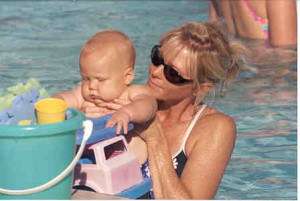
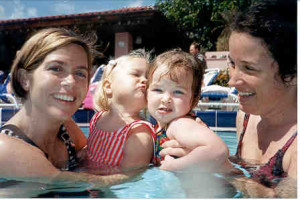
Gentle philosophy versus aggressive survival and backfloat swim lessons
Build the stage around the show…Little people 6 months through 4 years old, deserve special “handle with care” treatment. Nurturing the needs of each child, allowing them to unfold at their natural pace. To optimize your aquatic classroom for learning, combine an interactive curriculum with a well organized, yet spontaneous lesson plan. Together with mom and dad, through games, songs, laughter and engaging activities, you can create a warm, loving and safe environment.
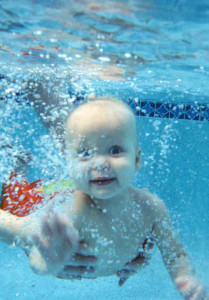 Baby swimming has many positive benefits, like sunken treasures beckoning to be discovered. In order to unveil these awaiting treasures, we need to build the stage around the show, to adapt the class to the level of experience and understanding of the children involved. Introduce skills when the children are relaxed and ready, and only skills that are age and developmentally appropriate, accommodating for individual differences. Patience, consistency, play, repetition, commitment and positive parenting are the pillars of a successful program.
Baby swimming has many positive benefits, like sunken treasures beckoning to be discovered. In order to unveil these awaiting treasures, we need to build the stage around the show, to adapt the class to the level of experience and understanding of the children involved. Introduce skills when the children are relaxed and ready, and only skills that are age and developmentally appropriate, accommodating for individual differences. Patience, consistency, play, repetition, commitment and positive parenting are the pillars of a successful program.
However, these treasures of the water are just as easily denied if children are not treated with dignity, understanding or respect. The program needs to be taught from the child’s point of reference, teaching them the way that they would want to be taught. Placing adult values and compressed time frames on infants and toddlers creates an imbalance and undue stress on all parties concerned. If skill acquisition becomes the only goal, meaningful learning on many levels can be lost. The priority must be focused on the positive development of the whole child, with swimming skills mastered as the child’s capabilities and “readiness” allows. Parents should never let panic (the fear of drowning) dictate an aggressive/intensive course of action in swimming lessons. “To avert an even graver outcome, great care must be taken.” (Omega) We must distinguish between short – term quick fix remedies and long-term responsible positive cures. A comprehensive strategy for water safety needs to be implemented, of which swimming is a part, however, the well being of the child should never be sacrificed in swim lessons to meet this end. Parents need to be well informed and implement all aspects of water safety. (i.e.. supervision, barriers, pool safety fencing, CPR and child centered swimming lessons).
 Swim lessons were never meant to be grim. Infants and toddlers should never be exploited in swim lessons to fulfill the accelerated expectations of a teacher or parent. Whether created out of a fear of drowning, compressed time frames, financial short-cuts or impatience. Parents need to realize that they can not live vicariously through their child’s accelerated achievements. Children should feel safe, be comfortable and experience trust. Pressuring children as a “necessary evil” to submit to rigid techniques and skills in swimming lessons that they are not ready for lacks compassion and understanding. This should not be a race for gold medals or a quest for imposed survival swimming. Often these “firm but gentle” techniques fueled by fear, place more emphasis on the firm than on the gentle. Society has learned that perpetrating violence or aggression toward children, perpetuates a cycle of violence and aggression. An adult simply would not tolerate such unrelenting acts of domination when used against them. Babies are not capable of fighting back. The emotional well of an infant runs deep; they possess a keen awareness of what is happening to them. Often the only avenue available to communicate their distress is through crying or non-verbal symptoms. These protests are not manipulation as their fears are real.
Swim lessons were never meant to be grim. Infants and toddlers should never be exploited in swim lessons to fulfill the accelerated expectations of a teacher or parent. Whether created out of a fear of drowning, compressed time frames, financial short-cuts or impatience. Parents need to realize that they can not live vicariously through their child’s accelerated achievements. Children should feel safe, be comfortable and experience trust. Pressuring children as a “necessary evil” to submit to rigid techniques and skills in swimming lessons that they are not ready for lacks compassion and understanding. This should not be a race for gold medals or a quest for imposed survival swimming. Often these “firm but gentle” techniques fueled by fear, place more emphasis on the firm than on the gentle. Society has learned that perpetrating violence or aggression toward children, perpetuates a cycle of violence and aggression. An adult simply would not tolerate such unrelenting acts of domination when used against them. Babies are not capable of fighting back. The emotional well of an infant runs deep; they possess a keen awareness of what is happening to them. Often the only avenue available to communicate their distress is through crying or non-verbal symptoms. These protests are not manipulation as their fears are real.
Teach me, don’t hurt me..
Parent’s, go watch an infant swim program before signing up. As a parent I would go unannounced, so you can see the actual lessons in progress not just the end result. Know what you are getting your child in to. These folks can be very convincing! Be aware of manipulation and distortion of the facts. Do not be under informed. Do not be misinformed. Do not be mislead. Do not be deceived. Beware of the “Trojan Horse” , who says that their swim lessons are enjoyable, but may be in fact be just the opposite. As the saying goes, if it walks like a duck, quacks like a duck and looks like a duck ………….
Do you wish your child to be treated in an impersonal manner, often with a blind eye to the babies feelings. Do you really believe that your infant or toddler is unaware of the cruel ordeal they are being subjected to. Beware of the justification of the use of force or dominance against your child in order for them to become “drown proofed”. Beware of methods denying oxygen to babies until they will flip on their back. If a teacher tells you to have your child “avoid breakfast”, head for the hills. If this type of abusive behavior in the swimming lesson was occurring in a land based program or a public school classroom, would you sign up? Don’t let your decision be determined by fear. These methods are telling young children in their formative years that aggression is OK. Possibly passing from generation to generation. It also erodes trust… mom and dad are putting me through this. What we need now is peace and joy in our children, peace in our world. The job of an “aware” teacher is to assist frightened children to playfully overcome their fear, not cause or create fear.
If you notice that children are crying or distressed on their way to the swim lesson (as well as in the pool) this should tell you that something is amiss. In some programs nearly all the children are crying and for nearly all the lessons. Where is the humanity in this, let alone sound educational practice. These programs use the twin negatives: fear and guilt, to the parents of the students. Telling the parents that allowing this abuse to continue to their child, builds character in the parent as well as in the child. This could not be further from the truth.
Too much stress to the innocent child can lead to a surrender and malnutrition of the spirit. Science has documented the fact that the seeds we sow in infancy, both negative and positive have a profound influence on the development of the mental and emotional blue print for the child’s entire life. Dominating or forceful methodologies fail to see the whole picture or the whole child. Intended to give parents “peace of mind”, they throw the child’s “peace of mind” right out the window. It is crucial to approach baby swimming more in human terms and less in clinical terms. The ripple of a pebble in the pond’s smooth waters, radiates outward in multiple concentric circles. So to does our teaching influence, affecting our young students on multiple levels. Not only must we seek the beauty of aquatic motion, but also tap into to the beauty of the child. Those individuals committed to this endeavor must be devoted to the highest good of each child with whom they come in contact. Let children enjoy their childhood.
Sadly, it is becoming more common for us to assist by deprogramming those children (and their parents) who have been traumatized by aggressive infant swimming survival programs and imposing infant aquatic back float survival programs. Nothing is worse than the opposing forces of an unrelenting, aggressive teacher colliding head on with a defenseless baby that is distressed and who is simply unable to handle the dominating agenda imposed upon them. “Do no harm”. As we enter the new millennium, parents need to be conscious of the fact that the subjugation, forcing or traumatizing of their child in order to learn how to swim, is archaic, stressful to the child and simply unnecessary. This reactionary approach, fueled by a psychology of fear, could result in “today’s solution ending up being tomorrow’s problem.” It’s the “get it done now, I don’t care how you do it”, mentality. Imposing unchallenged manipulation on infants and toddlers with force and tough discipline, demonstrates a great lack of knowledge, experience and understanding of teaching and caring. Teachers and parents need to stay in touch with the feelings and perceptions of the child as the immediate and long term consequences of their actions can impact the child for life, both emotionally and mentally. What is expedient and what is ethical may be two different things. Making infant swimming “survival” back float an imposed priority to unwilling infants and toddlers or children of any age can have a devastating effect on the well-being of the child, as well as society. The same holds true for forced frontal submersions and guaranteeing children to swim or to be “drown proofed” in compressed time frames. Let it be known that crying, distress or the surrendering of one’s spirit are not prerequisites to learning how to swim. These young souls need to be treated respectfully and not violated. Wise parents know that there are better choices. “Teach me, don’t hurt me”. Teaching should be inspirational and love based, not fear based. As parents and teachers our intent must be focused on sowing the seeds of kindness which will bear fruit of a most wondrous kind-beautiful, caring human beings.
Below is a quote from the Hattiesburgamerican.com 6/7/2008
SensibleParent wrote:
“Am sure that the instructor cares about children – ALL moms and teachers do. As to ‘survival swim lessons’ – hopefully she does not use back survival floating (or aggressive pre-mature frontal submersions) for babies & young toddlers.
Back survival floating is an obscure method which has been discarded by American Red Cross and YMCA despite recent media attention to the acrobatics of babies performing the skill. The skill is viewed as cool but do you know what they have to do to your child to get them to do it???? They don’t bop them on the nose with a newspaper – worse – they are allowed to get to the surface only if they turn correct way underwater. Don’t accept the pitch of those who exploit parents fears of drowning. Use sensible drowning preventatives and get your children (when they and you are ready) to a YMCA or American Red Cross program or any program (gentle swim school) where they treat children respectfully rather than slam dunk them. If there are screaming children, throwing up, traumatized kids – steer clear of any such programs.” signed Sensible Parent
Here is a story (Troubled Waters) on 60 Minutes Australia contrasting two swim teaching philosophies, that of the legendary teacher/coach and swimming safety advocate, Laurie Lawrance and that of another approach. Some programs use fear and parental guilt to promote and validate their insensitive and harsh teaching methods. Other programs goes as far as to exploit parent’s emotions by showing interviews of parents whose children who have drowned and then imply that their program is the only way to solve the tragedy of drowning. However, there are many proactive positive, happy swim methods available, as well as effective water safety strategies to prevent drowning.
Below is another comment from parent in Louisville, Kentucky on the WDEF News 12|News website
Be not afraid, be sensible THINK!
Submitted by Concerned Parent on May 27, 2009 – 8:42pm.
“Parents have to decide how rationally / irrationally they will react to the banging of the Drowning Drum (for commercial purposes).
To come daily in clothes is correct only if you are most interested in drowning lessons. In real numbers – very few babies & children drown or nearly drown compared to other types of in-home children accidents. And 99.9% of ALL USA programs have 100% success rate of no drowning of graduates – there is no unique benefit as claimed.
Go instead to a sensible program with your child in suit and swim diaper to learn skills that will lead to swimming … and have fun doing it!
And for those who are impressed with the (back survival) float… it’s not about the float, it’s about the FACE (of a First-day Beginning student – that isn’t shown in advertising that is screaming when not gasping for a breath while being WATERBOARDED, with this bopped-on-the-nose with a newspaper type animal training).
It can easily be a case of the cure being worse than the cold. Reports of children developing stutters where they haven’t stuttered before and of throwing up at home at the mention that it is time for their ‘survival’ lesson having developed an aversion to adults in authority as a result of harsh survival training & treatment on the children of thoughtless fearful adults.
Survival is all the preventatives you do FOR your child, not what you do (magically) TO your child!
Safety = Watch and keep young children with reach when near water; install fences & alarms & locks and other barriers between home & pool; parents & other caregivers learn CPR; and enroll your child in a sensible appropriate aquatic program when you and the child are ready e.g. Y, Red Cross, Park & Rec or swim school.
YES to swim lessons but NO to being scared and tricked into the need for ‘survival training’ – it’s isn’t essential or ‘good’ for your child. Parents who unwittingly hand over the family jewels to the survival instructors should thus also be willing to undergo similar survival training themselves where air (getting a breath)is used as a reward.
Are you willing to be locked in a closet until you drop your unhealthy excess body weight? It IS ‘essential’ and you to should undergo this ‘survival training’ don’t you think…since you certainly can die or nearly die carrying around all that extra weight! ‘No way’ you say? Your child is to small and defenseless to opt out of WATER survival training you are stuffing down their throats and up their noses!
Do you work in sales? Shouldn’t air in your office or phone room should be limited until you make a sale? (since your child is held back underwater until they make the proper turn upward toward the surface of the water to get a breath – as is the practice in ‘learning to survive’ in the pool. Those who torture ‘for good reason’ should also be willing to endure similar misuse of operant conditioning in equal measure to that which they are forcing on their child (or student).
If it is such good training how come neither the Red Cross or Y or US military organizations have adopted it over the past 40+ years that in has been around. Imagine a non-swimming soldier in training (or your non-swimming self) undergoing the same training! Call 911 for the injured instructor attempting to implement this type of training on those who actually COULD fight back. Imagine yourself in your child’s place for heavens sake! THINK!
THINK WHAT YOU ARE DOING TO YOUR CHILD!!! Get to a sensible program when you and your child are ready and put into action the water safety drowning prevention measures as your child moves toward becoming a strong swimmer.”
Below is a quote from Beatriz from Melbourne, Florida January 13, 2011
Dear Rob:
I am a cancer patient and lap swimmer. I credit swimming with my survival of 21 years. I have stage 4 metastatic breast cancer It’s has metastasized to my lung now but I swim a mile of laps between 4 and 5 times a week.
Recently swimming lessons for children are being conducted in the “exercise pool” next to the lap pool. I’m witnessing gasping, screaming, weeping children, begging to get out of the pool. The sobbing and screaming goes on for twenty minutes at a time! It has become so stressful for me to listen to this that this evening, I had to stop lapping after only ten laps.
Not only are such swim lessons cruelty to the child, they break the heart of any caring mother or grandmother who has to witness them. I had dreams about them last night.
Today I heard the screaming AGAIN when I went to swim. By the time I got to the pool, they had the child on the deck and were dressing him. The “lesson” was over.
Is this professional? Am I a crank? I love children. I have five children and ten grandchildren. Two of my sons are lifeguards and four of my grands are on the swim team but never was anyone in my family ever subjected to this abuse. What’s the matter here?
I will very much appreciate hearing from you.
Thank you for your prompt reply.
Beatriz in Florida, USA
We are more about the whole person, than just the skill. Children learn who they are and how they perceive the world. Learning to swim especially for babies, is not just about acquiring a physical skill, not just adding to intellectual skill. It is about the whole person. If you isolate into just skill or isolate into just intellectual acquisition, you basically miss the concept of true human potential, which is not a score on an IQ test or winning a race but rather how we exist and who we are as human beings. We would rather see someone become balanced. Think about it. If you had a wish for your child, it would be to become a happy, well balanced, competent contributor to the family, the community, society and the planet. With a centered child comes the balance of body, mind, emotions and a soaring, peaceful spirit.
Children should enjoy the water experience from day one, providing a rich, supportive setting allowing them to develop into healthy and happy individuals, as well as competent swimmers. Parents (and teachers) need to be relaxed, in tune with their child and create a positive, proactive and happy atmosphere. It is important that they too enjoy class. Children need to be comfortable and confident above water before they can ever begin to swim with their face in. Celebrate each small step along the way. Create an environment that unlocks the sunken treasures, generating a life long love and respect of the water, as well as, a life long hunger for learning and exploration. All serving as a catalyst, planting a seed, for the child to reach their full potential.
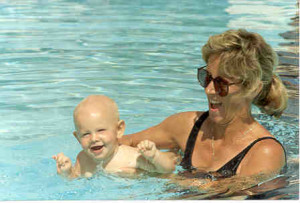
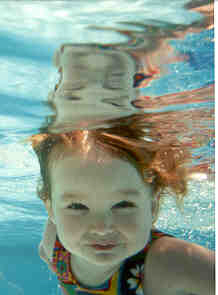
The first three years of a child’s life are the most impressionable. What occurs during this critical and formative window of time will have a dramatic effect on the child for the rest of their lives. Swimming is often the first organized activity on their journey of life. As privileged stewards, parents and swim teachers owe it to these budding water babies to make this an uplifting, joyous experience. Our hope is that these children will grow into well adjusted and caring adults, living a fruitful life, contributing to society and our beautiful water planet in a positive way.
